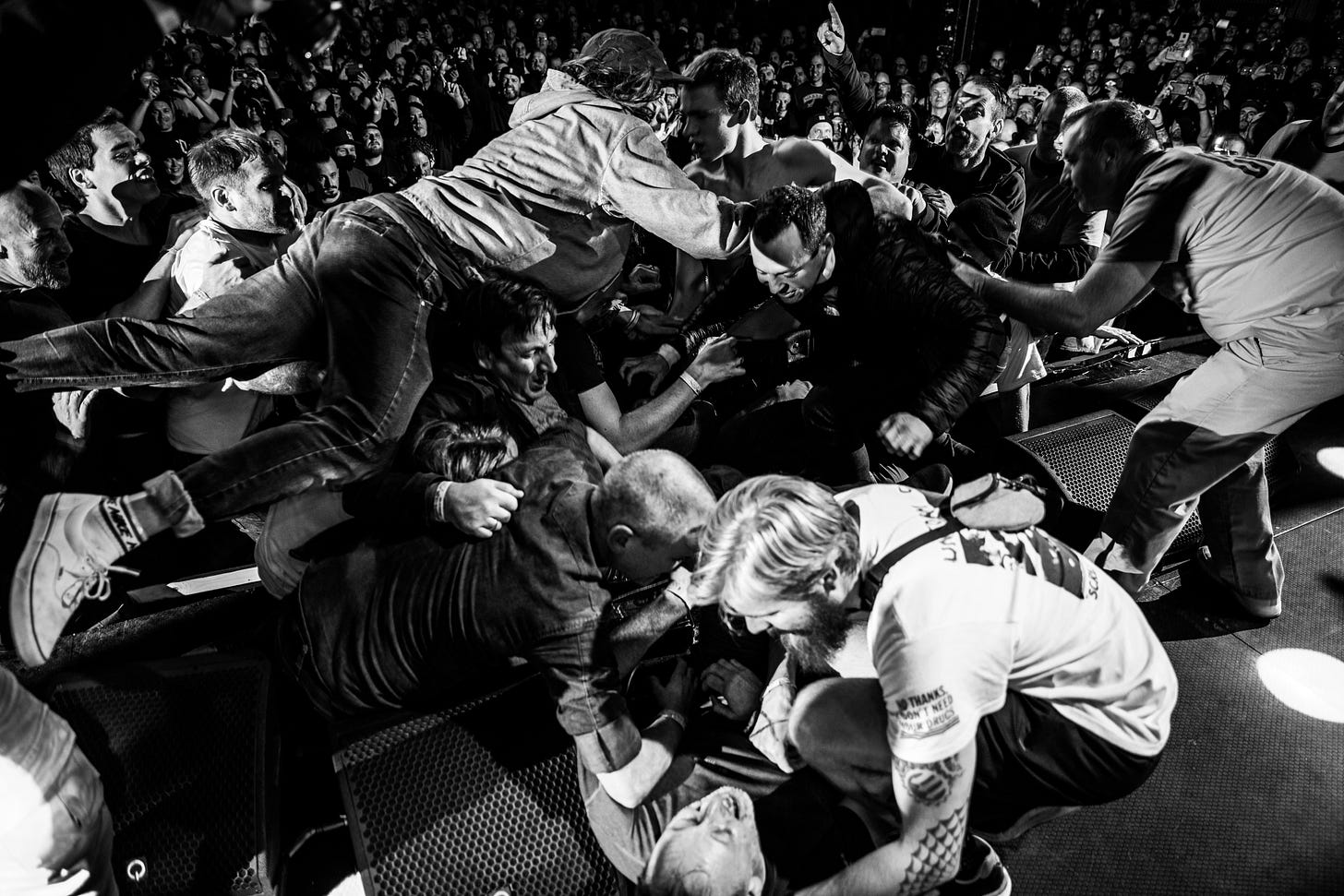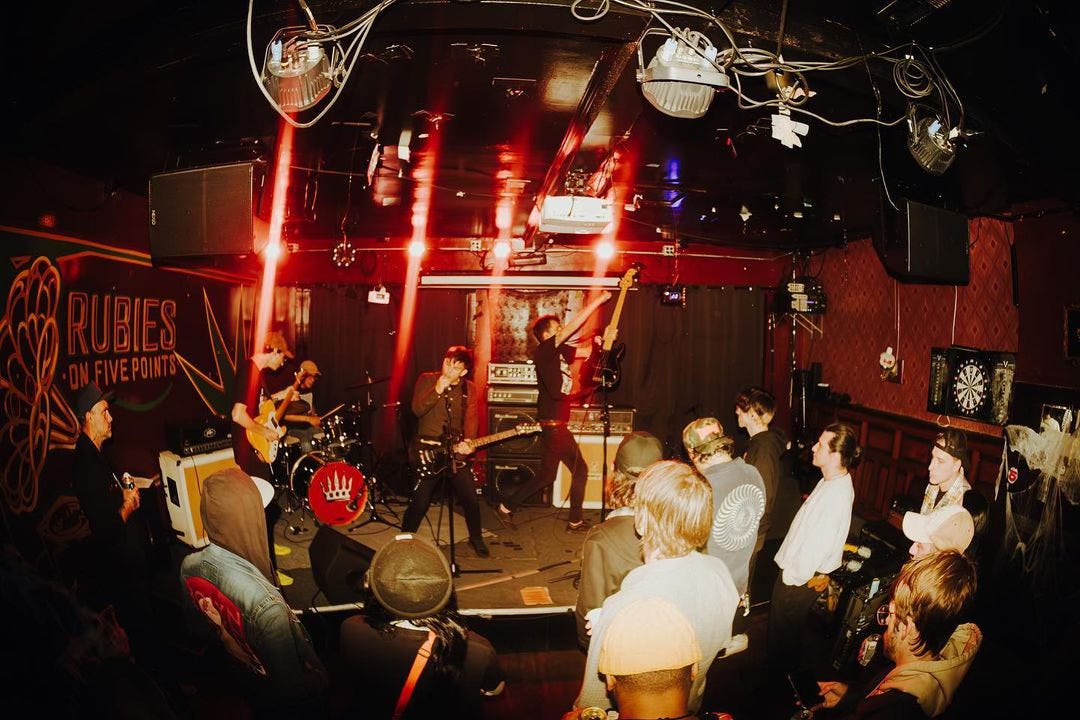Access All Areas
From where you live to what you can afford to who you meet, how you experience hardcore is directly tied up with how much of it is accessible to you. Whether that's a feature or a bug is up to us.

I.
Shelter took me to Europe for the first time in the fall of 1993. I kept a journal on that tour, but I probably didn’t need one. Most of the shows, especially in the big cities, echoed the kinds of shows I was used to in America. Everyone had the same records and the same haircuts and the same reference points, more or less. But that wasn’t the case everywhere we went. Before the internet, there were more barriers to discovery in Europe, and this bore itself out in ways that were unpredictable at the time. It was the first time I’d ever really thought about access as it pertains to developing—or even reproducing—hardcore as a culture.
There was a show somewhere in Poland, for example, where bootleggers openly set up shop outside of the club to sell dubbed copies of Attaining the Supreme—the album that Shelter was supporting at the time—among several other illicit hardcore CDs and cassettes. I asked a Polish friend who was traveling with us how this ostensibly unethical, if not illegal pop-up record store could operate only steps away from a show where we were selling “authorized” copies of the album, and he explained that these bootleggers were probably the reason why anyone at the show even knew who we were. Import records were so prohibitively expensive in Poland at that time that many hardcore kids couldn’t afford to buy them. They weren’t trying to rip us off, he said. In their minds, they were supporting us. This was an issue of economic access.
When we got to Sweden, the members of Refused were clearly excited for us to play their hometown of Umeå. Shelter would be, according to them, the first American hardcore band to ever play there. I remember wondering what it might look like when a hardcore scene develops so completely on its own like that—without the outside influence of American hardcore bands coming to play—so I was completely surprised to see 300 kids show up to the venue, with seemingly all of them wearing a uniform of Victory Records t-shirts, Krishna beads, and baggy pants. Dennis Lyxzén joked, “We turned our entire high school vegan straight-edge!” Only maybe it wasn’t a joke. This was an issue of cultural access, where Refused and their friends transmitted whatever parts of the culture they managed to absorb for themselves to whatever young people they could find. It just so happened that all of the local young people went to their high school.
More than anything else, though, I remember meeting “the Side By Side kid.” It was the first day of tour, and we were in the former East German town of Chemnitz—four years after the fall of the Berlin Wall, still several years before the internet became ubiquitous. The Side By Side kid was waiting outside of the venue almost as soon as we got there, by himself, because he was so excited for the show. In 1993, I wasn’t much older than the Side By Side kid, so I decided to strike up a conversation. He told me about how disconnected he felt from the world when East Germany still stood behind the wall. He told me that he was able to discover hardcore not long after reunification, while visiting Berlin. He also didn’t have a lot of money, but that didn’t stop him from embracing hardcore fully: I call him “the Side By Side kid” because he was wearing a homemade Side By Side t-shirt—and as wonky as it was, he was extremely proud of it. Which made it the coolest thing to me.
“I make my own shirts, I trade tapes, whatever I can do,” he said. “When it comes to hardcore, I take what I can get.”
His was an issue of access in almost every facet of the word. But the reason why I’ve never forgotten him is because he acknowledged those challenges, and then he forged his own path. For the Side By Side kid, limited access was an opportunity to create something new.

II.
When I started Anti-Matter again last year, access was a major consideration: Physical fanzines are expensive to produce and distribution models typically favor urban centers, so I chose a digital format that anyone with a phone (or an internet cafe) could read. Financial accessibility was also a consideration when I set up the open subscription model—even if, ultimately, I will only be able to continue publishing if the people who can afford a paid subscription take that option. I’ve talked about those things before. What I haven’t talked about before is access to coverage.
To state the obvious, publishing a weekly interview solely with artists who fit the upper echelons of popularity in our community is an unsustainable project. I realize that “big names” attract new readers and introduce Anti-Matter on a grand scale—the last two weeks of conversations with Brendan Yates of Turnstile and Civ from Gorilla Biscuits are among the highest “performing” posts I’ve ever published—but there really aren’t enough of these names to sustain that kind of momentum, nor would a publication like that truly reflect the depth of this community. So it’s interesting to me that, in conversation, I’ve heard many people separate the artists I’ve featured so far into the categories of “older bands” and “newer bands”—as opposed to “smaller bands” and “bigger bands.” And that’s probably because “newer bands” like Anxious or End It are not exactly tiny, and I didn’t particularly feel like featuring them was a risk. I want to change that.
This week, I am choosing to get back into the spirit of the original Anti-Matter by casting a bright light on a “smaller band” that I have been championing for the last seven months—and who, in my year-end review, was also responsible for my favorite hardcore song of 2023. And as it turns out, access also plays a part in the story of Germany’s Phantom Bay.
“I got into this scene around 2007 or 2008,” recalls Michael Hanser, the band’s singer/guitarist, for a conversation that will be published in full on Thursday. “I grew up an hour south of Vienna, where we didn’t have anything like a countercultural music scene. There wasn’t really anything. I discovered this music purely through the internet. I didn’t have anyone showing me. I got into alternative rock first, and then I used the internet as my way to discover other bands from there. I would find out when these bands would play shows in Vienna, and I would go up there. And from there, I slowly made my way into the local punk and hardcore scene. That’s where I discovered that this was something that you could do yourself and play, too.”
Michael’s experience in rural Austria didn’t leave him with very many options, as far as he was concerned, but discovering hardcore on the internet allowed him to see himself inside of a world that he could feel a part of—even when he was only living vicariously through YouTube videos of American house shows (which he was). Still, that’s access.
In the same way, creating access to coverage here is about opening our imagination into what lies ahead for our community. Hardcore’s health and survival depends on how we nurture and support the bands who are coming up so that they stand a chance to help write the future. In the context of Anti-Matter, it’s about amplifying the reach of those bands that I truly love—regardless of how many records they’ve sold or how far up on the bill they are. (For you, the reader, that means taking a chance on something new yourself.) But this is also for that kid in rural Austria today, in 2024, who might not need to see themselves inside of an American hardcore show on YouTube anymore because they’re reading about Phantom Bay now, and because that feels closer to their experience. Access isn’t always an issue of fairness, or even equity. It’s about sparking imaginations and generating possibilities where there weren’t any before. It’s a cause for innovation. It means creating new opportunities to see ourselves.
III.
It’s easy to assume that some people have had all the access in the world, especially by virtue of when they discovered hardcore or where they grew up. I’ve already written a lot about my early years, but here’s something I haven’t told you: There were countless records I never bought because I only had so much money as a teenager to buy records, and very early on I decided that I would rather spend that money on getting into shows. And yet there are also countless shows that I didn’t get to see—either because, again, I didn’t have the money to see them or because it was one of the dozens of shows where Louise decided my fake ID was no good to get into CBGB. This is one of the real and most untalked-about mysteries of CBs: Whether or not you were underage and you got in was completely arbitrary. Louise knew who I was. On some days, she “believed” I was 16. On other days, she didn’t. Whenever I saw her at the door, I knew: Access was literally up to her whim.
Over the years, though, I’ve come to understand that who I am is as much about the things I missed as it is about the things I witnessed. I didn’t get into the now-infamous “shutdown show,” which coincidentally, featured Side By Side. I also got turned away from the Roger Miret benefit show in January of 1989. (That one hurt.) Those omissions are a part of my story, and their absence also informs my unique experience in some way.
Ultimately, I am able to talk to you about the Side By Side kid today because regardless of the things that he or I missed, or perhaps because of them, we still recognized each other as two versions of the same person, with two disparate measures of access. One isn’t necessarily better than the other. One isn’t more legitimate than the other, either. When the Side by Side kid said that, when it came to hardcore, he took what he could get, I didn’t doubt him for a second. I just said, “Me too.”
Coming on Thursday to Anti-Matter: A conversation with Michael Hanser of Phantom Bay.
Anti-Matter is reader-supported. If you’ve valued reading this, please consider becoming a paid subscriber and backing independent, ad-free hardcore media. Your support is CRUCIAL to Anti-Matter’s continuation and growth. Thank you, friends. ✨



Thanks for saying the quiet part out loud regarding the sustainability of this project for you. Leading with that honesty feels like a fair approach both for yourself and for readers.
Those Phantom Bay folks are real gems. Stayed with me when they played New Brunswick before Fest, and were delightful.